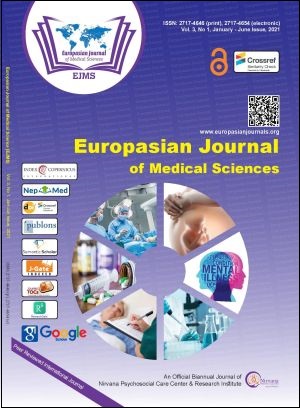Misconception and Effect of Menstruation (Chhaupadi) and Delivery on Women’s Health in Bajura, District Nepal
Keywords:
Chhaupadi practices, Menstruation Misconception, Women’s Health, Traditional Practice during MenstruationAbstract
Background: Chhaupadi is the old unscientific system in mid and far western parts of Nepal. Reproductive age women were considered unclean during the menstrual and delivery period. Invisible cultural taboos and practices were prevailing in each and every household. The objective of the study is to assess the associated factors affecting during Chhaupadi and delivery practice with their health outcome.
Method: The cross-sectional descriptive study was conducted amongst 175 reproductive age women in Bajura districts of Nepal, by using multistage random sampling. Both qualitative and quantitative methods was used. All the data were entered in Ms excel and exported into SPSS 16.0. The necessary descriptive and inferential statistics was used for quantitative analysis and thematic analysis was done for qualitative analysis.
Results: More than one third (38.9%) of the participants were in the age group 20-29 years. Almost all the participants were from Hindu religion. The majority (91%) of participants know about the Chhaupadi system. Almost (74%) of the participants were staying in the Chhaupadi hut during menstruation. Similarly, (78.3%) of the respondents were mentioned, they did not like the Chhau system and never like to continued. There is a
significant association between health effect in women and the Chhaupadi system (p < 0.031).
Conclusion: We conclude that the larger proportion of women in Bajura District still believes in old unscientific tales and Chhaupadi practices which lead to the different health problems.
Downloads
Downloads
Published
How to Cite
Issue
Section
License
Copyright (c) 2021 Chetraj Pandit, Anil Kumar Singh, Ayuska Parajuli, Ashok Pandey

This work is licensed under a Creative Commons Attribution 4.0 International License.
The author(s) retain the ownership of the copyrights for their work published in EJMS without any restrictions. Upon submission, the author(s) grants EJMS a license to publish, including to display, store, copy, and reuse the published content.
License to Publish
By submitting a manuscript to EJMS, the author(s) grant the journal a non-exclusive license to:
- Publish and distribute the content in all formats, media, and platforms (both existing and future), while identifying EJMS as the original publisher.
- Reproduce, display, and store the content in both print and online formats, including institutional and digital repositories.
- Translate, adapt, and summarize the work, including reprints, extracts, and abstracts.
- Develop derivative works based on the original content.
- Include the work in electronic databases and provide links to third-party materials.
Creative Commons Licensing
In addition to EJMS’s publishing rights, authors grant third parties the right to use, share, and distribute their work under the Creative Commons Attribution 4.0 (CC BY 4.0) International License. This allows unrestricted use of the content, provided proper attribution is given to the original author(s) and the journal.

